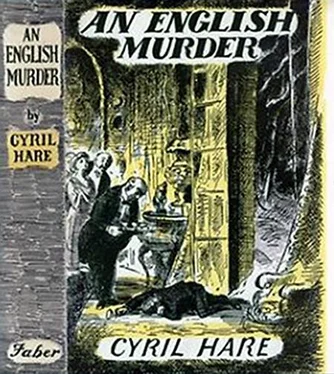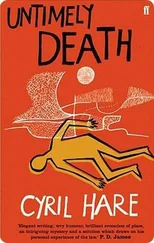"Were you referring to meals, sir?" he asked.
"Well, yes, meals are the crucial point, I suppose. I can occupy myself very well up here at other times. What is your advice?"
"I ventured to mention the problem to his lordship just now. The difficulty, as you will appreciate, sir, is one of staff."
"I confess I had not altogether appreciated that difficulty."
"In the old days, sir," Briggs went on reminiscently, "there would have been no trouble. There would have been four in the kitchen and two footmen under me, and of course the servants the visiting ladies and gentlemen brought would have been available to assist. But as things are, with me being single-handed, as I told his lordship, I really could not undertake to serve meals separate. One service in the dining-room and one in the servants' hall is as much as I can manage—with a tray upstairs for his lordship, of course. So if you don't mind, sir——"
"I quite understand, Briggs. I shall be honoured to have my meals with you while the guests are here."
"Oh, no, sir! I did not mean that at all. I wouldn't have dreamt of even suggesting such a thing to his lordship."
Dr. Bottwink realized that once more, despite his best endeavours, he had been guilty of a social faux pas . "Well," he said resignedly, "I am in your hands, Briggs. Then I am to take my meals with the family party?"
"If you don't mind, sir."
"Mind? How should I? It is to be hoped that they will not mind. I shall be delighted to meet Sir Julius, at any rate. He can enlighten me on some points of constitutional practice which I still find rather obscure. Perhaps you can tell me who else I am to meet?"
"There are just two ladies, sir, Lady Camilla Prendergast and Mrs. Carstairs."
"Lady Prendergast is a member of the family also?"
"Not Lady Prendergast, sir—Lady Camilla Prendergast. A courtesy title. She is addressed as Lady Camilla, being an earl's daughter. She is a niece of her late ladyship's first husband. We count her as a member of the family. Mrs.
Carstairs is not related, but her father was rector of this parish for many years and she was brought up in the house, so to speak. That is all the party—except for Mr. Robert, of course."
"Mr. Robert Warbeck, the son of the house—he is to be here for Christmas?"
"Naturally, sir."
"Yes." Dr. Bottwink was speaking to himself. "I suppose it is natural. Curious that I should not have thought of him." He turned to the butler. "Briggs, I suppose it would be impossible for me to have my meals in the servants' hall after all?"
"Sir?"
"I don't think I shall greatly enjoy sitting down at table with Mr. Robert Warbeck."
" Sir? "
"Oh, now I have shocked you, Briggs, and I should not have done that. But you know who Mr. Robert is?"
"Of course I do, sir. His lordship's son and heir."
"I am not thinking of him in that capacity. Do you not know that he is the president of this affair that calls itself the League of Liberty and Justice?"
"I understand that to be the fact, sir."
"The League of Liberty and Justice, Briggs," said Dr. Bottwink very clearly and deliberately, "is a Fascist organization."
"Is that so, sir?"
"You are not interested, Briggs?"
"I have never been greatly interested in politics, sir."
"Oh, Briggs, Briggs," said the historian, shaking his head in regretful admiration, "if you only knew how fortunate you were to be able to say just that!"
Sir Julius Warbeck allowed the rug to be adjusted over his knees, exchanged a few last words with his secretary, and leaned back wearily against the cushions as the car drove away from Downing Street. On the seat beside him was an official bag, containing the latest report on the vital negotiations then being conducted in Washington on behalf of the Treasury with the government of the United States. It was there to occupy him during the two hours' drive to Warbeck, so that not a moment of the Chancellor's precious official time should be wasted; but the car had threaded the maze of central London and began to cruise smoothly along the arterial road before Sir Julius made a move towards it.
He drew the bag on to his knees, unlocked it and began to study the closely typed sheets. It was an admirably written report, he reflected, as one might expect from Carstairs. He felt a little pride as he remembered that Carstairs had been his discovery in the first place. There could have been few who foresaw ten years ago the position that that young man was likely to attain, and Sir Julius, who was not usually slow to give himself credit for his own achievements, gave himself full credit for having been one of them.
Dun-coloured clouds, threatening snow, obscured the wintry sky, and the figures began to dance before the Chancellor's tired eyes. He was glad to take the excuse to return the report half-read to the bag, and to lean back again in his seat. Carstairs! The name recurred to him with a hint of irritation. Yes, undoubtedly that fellow had come a long way and was going further yet. More than one informed writer had spoken of him as the next Chancellor of the Exchequer, and Sir Julius, with the realism of an experienced politician, admitted to himself that nobody could last for ever and that he should be thankful that there should be such capable shoulders waiting to take up the burden, when the time came for him to lay it down. (Not that that time was likely to come soon, whatever some people, Carstairs included, might be inclined to think!) But he had to admit to himself that in his heart of hearts he did not like his brilliant young colleague. There was something about the man, for all his undoubted charm and talent, that was not quite—the dreadful words well bred flickered in his mind. He exorcized them with a shudder. This would never do! Alan Carstairs was an excellent fellow. It was not his fault—it was very much to his credit—that he had risen in the world with so few initial advantages. Remembering his own assured background, he ran over in his mind the pattern of Carstairs' career. Elementary school, scholarships, the London School of Economics, a fortunate marriage—yes, a very fortunate marriage, Sir Julius reflected. Without the encouragement of that active, ambitious woman, would he have ever got anywhere, for all his brains? Mrs. Carstairs was to be at Warbeck, his cousin had told him.
"I must remember to say something civil to her about her husband," he said to himself.
Somehow he always found it difficult to be civil to Mrs. Carstairs. She had a way of belittling all politicians except her beloved Alan. And Sir Julius did not relish being belittled.
He sat for a time staring absently in front of him. Beyond the glass partition he could see the rigid backs of the two silent men sitting in front. Their stiffness and impersonality, even towards each other, affronted him. Why should officialdom always tend to turn men into automatons? Sir Julius liked to think of himself as a genial, friendly type of man, conscious—as was only proper—of his own position and what was due to it, but within proper limits human and approachable.
But try as he would, he had never succeeded in getting on proper terms with these two. There must be something wrong with them. Holly, the driver, was not so bad. His people lived near Markhampton, and Sir Julius had been at some pains to arrange that he should take the car on to his home over Christmas, calling at Warbeck Hall for the return journey after the holiday. He had at least shown some gratitude for the gesture, though not as much as might have been expected. But the other man—Rogers—the detective assigned to him by the Special Branch of Scotland Yard—what could one make of him? Sometimes he wondered whether Rogers was human at all. For the last three months the man had been his constant shadow, and he was no nearer to knowing him than he had been at the beginning. The fellow was quiet, civil, answered when spoken to, and that was all that there was to it. No doubt he should consider himself lucky that Rogers possessed no actively disagreeable quality—unlike the dreadful man who had preceded him and sniffed continually—but he remained dissatisfied. It was disheartening to be so much in the company of a man on whom one could make no impression. That, if he had but known it, was the root of the whole trouble. Sir Julius, vain gregarious soul that he was, had made his career by impressing other people. It was a cruel fate that had given him for guardian a man whom the warm rays of his personality impressed no more than if they had been the cold beams of the moon.
Читать дальше












